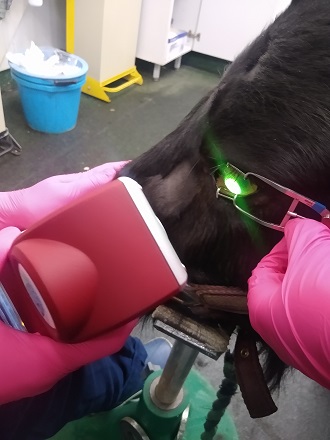Corneal Cross-Linking Progress
Clinical Connections – Summer 2022
Maria-Christine Fischer, Lecturer in Ophthalmology, and Vim Kumaratunga, former Ophthalmology Resident
Corneal cross-linking (CXL) is a highly attractive treatment for infectious keratitis and melting (malacia). The RVC’s Ophthalmology Service has been offering it for more than two years.
Infectious keratitis can have disastrous, sight-threatening consequences. The bacterial pathogens and the white blood cells recruited to defend the cornea both release various proteases. These can rapidly break down the collagen matrix of the corneal stroma, leading to keratomalacia. This is often termed ‘melting’, due to the appearance of the softened cornea. Infectious keratomalacia poses a high risk of corneal perforation and can lead to the loss of the eye.
The first-line treatment for ulcerative keratitis currently involves highly intense use of topical antibiotics, ideally based on cytology and culture and sensitivity results, as treatment success relies on the pathogens being sensitive to the product chosen. However, bacteria that cause infectious keratitis are increasingly found to have multidrug-resistant profiles in veterinary medicine. Furthermore, the ever-increasing population of brachycephalic dogs are at elevated risk of developing ulcerative keratitis.
CXL increases resistance of corneal tissue to enzymatic digestion through formation of new chemical bonds between stromal fibres. In addition, CXL has the ability to kill microorganisms regardless of their antimicrobial resistance pattern. Early treatment can halt progression of corneal melting and prevent surgical intervention and thereby improve visual outcome.

With the increasing prevalence in infectious keratitis and the continued expansion of antimicrobial resistance, it is paramount to drive the development of non-traditional treatment options which reduce selection pressure promoting antibiotic resistance in bacteria.
CXL is well-established in human ophthalmology as is easy to perform, safe for the patient and can be combined with other surgical or medical therapies. This makes it a very appealing therapy for the treatment of corneal malacia.
In addition to small animal patients, the Ophthalmology Service treats equine patients and species referred to the exotics team. The CXL machine at the RVC is very easily portable, which makes it extremely useful for standing equine procedures under sedation. The machine was purchased with the aid of an RVC Animal Care Trust grant. The registered charity of the RVC aims to improve animal health and care through clinical practice, education, and pioneering research.
Growl Tiger
The three-year-old Shetland gelding ‘Growl Tiger’ (pictured) was treated with CXL recently with an excellent outcome. Growl Tiger presented with a one-week history of deteriorating left corneal ulceration, which progressed to a keratomalacia. In his case, the malacia was severe and there was associated intraocular inflammation (uveitis). This can be very painful and lead to further intraocular complications, such as chronic distortion of the pupil, chronic intraocular scarring (synechiae) and can, in some severe cases, lead to glaucoma.
Treatment with CXL and placement of a sub-palpebral lavage system for ‘remote’ delivery of eye drops, resulted in complete healing of the malacic corneal ulcer over a period of three weeks. As a result of this treatment, the team was able to save Growl Tiger’s eye and vision and restore ocular comfort. Since discharge, Growl Tiger has returned to living a content life with good vision and a comfortable eye.
Case recruitment for CXL research
The RVC Ophthalmology team is currently researching the antibacterial effect of cross-linking on corneas and conjunctiva of canine patients with infectious ulcerative keratitis and is recruiting cases. The inclusion criteria are infectious keratomalacia, bacteria present on cytology, ulcer diameter of less than or equal to 12mm, ulcer depth of less than or equal to 50% corneal depth and client consent.
To refer or discuss cases, please contact Dr Maria-Christine Fischer or Dr Juliette Preston via qmhophthalmologyteam@rvc.ac.uk.
